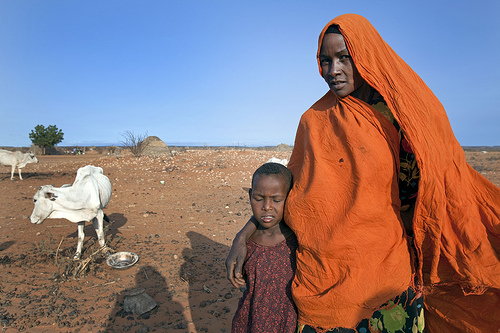In the current, second round of the UN Human Rights Council’s Universal Periodic Review (UPR) of all UN member states, Ethiopia soon faces the scrutiny of its peers. While the full review is scheduled for January 2014, HIC-HLRN and Oakland Institute (USA) have prepared and submitted a joint stakeholder submission on 15 September, as part of the documentary basis for the upcoming review.
The HIC-HLRN/Oakland Institute report focused on the human rights dimensions of Ethiopia’s “villagization” program, which has been the driver of unremedied displacement and dispossession over the years under the pretext of “development.” However, as the report finds, the benefits have reduced to a system of advantages for the few, enjoyed on a partisan basis, and resettlement services meted out for those acquiescing to the will of the ruling party.
The destructive consequences have violated human rights to livelihood and culture for land-based peoples, especially in the peripheral regions. Involuntary resettlement, a form of forced evictions, accompanies deprivation of the right to food, including the right feed oneself, particularly for agropastoralists. Their consequent loss of productive land and the enforced ban on cultivating traditional-tenured lands have amounted to the official use of food as a weapon, but not for the first time in Ethiopia.
The report also addresses the process human rights such as freedom of association and access to justice in this context. Repression of inquiry notably prevents journalists from their customary functions, while extending similar threats to anyone openly critical of the government’s contentious policies and practices.
Meanwhile, the joint report acknowledges the existence of Ethiopia’s Human Rights Action Plan (NHRAP). However, Oakland Institute and HIC-HLRN point out that the plan is consistent with the government’s failure to recognize the concept of indigenous peoples in the state’s territory. This omission hampers the NHRAP’s ability to address the human rights violations of indigenous Ethiopian peoples, not least the customary norm to respect their special needs and human rights to land.
In the joint report’s list of recommendations toward human rights-centered development, it places the corresponding obligations to remedy the gross violations squarely on the duty-bearing state and Republic of Ethiopia. However, the submission also asserts the extraterritorial human rights obligations of other states that variously collaborate in human rights abuses with technical and financial backing to the Ethiopian government. This inquiry into the human rights record of Ethiopia also implicates those other states, including members of the UN Human Rights Council, for their role in the commission of violations in Ethiopia and their liability also to make reparations for them.
Download the joint Oakland Institute/HIC-HLRN submission.
See related Oakland Institute publications:
Development Aid to Ethiopia: Overlooking Violence, Marginalization, and Political Repression
Ignoring Abuse in Ethiopia: DFID and USAID in the Lower Omo Valley
Omo: Local Tribes Under Threat
Link to “Ethiopia: Dams and Destroying Peoples for ‘Development’,” in Land Times No. 7 (2013).
Download














